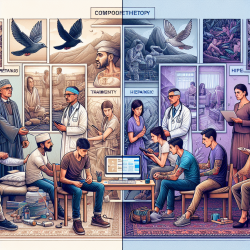As practitioners dedicated to improving child communication outcomes, we understand the importance of utilizing validated tools for comprehensive assessments. The research article "Dveloppement de la version qubcoise francophone du Childrens Communication Checklist 2 (CCC-2). Traduction, adaptation et quivalence conceptuelle" by Vzina et al. (2011) offers invaluable insights into the translation and adaptation of the Children's Communication Checklist-2 (CCC-2) for the Quebec French-speaking population. Here, we explore how these findings can enhance our practice and encourage further research.
Key Insights from the Research
The study addresses a significant gap in evaluating pragmatic language skills in Quebec French-speaking children. Pragmatics, or the use of language in social contexts, is crucial for differential diagnosis and intervention planning. The CCC-2, originally developed by Bishop (2006), is a well-recognized tool for assessing these skills. The research meticulously translated and adapted the CCC-2, ensuring linguistic, cultural, and conceptual equivalence with the original version.
Why Pragmatics Matter
Pragmatic language skills are essential for effective communication and social interaction. Deficits in these skills can be indicative of various developmental disorders, including Autism Spectrum Disorders (ASD) and Specific Language Impairment (SLI). The adapted CCC-2 helps practitioners identify subtle pragmatic issues that might otherwise go unnoticed, thereby aiding in accurate diagnosis and tailored interventions.
Practical Implementation in Your Practice
Incorporating the Quebec French version of the CCC-2 into your assessment repertoire can significantly enhance the accuracy of your evaluations. Here are some steps to effectively implement this tool:
- Training: Ensure that all team members are trained in administering and interpreting the CCC-2. Familiarize yourself with the specific adaptations made for the Quebec French context.
- Holistic Assessment: Use the CCC-2 alongside other assessment tools to get a comprehensive understanding of the child's communication abilities. This multi-faceted approach can provide a clearer picture of their strengths and areas for improvement.
- Data-Driven Decisions: Utilize the data from the CCC-2 to inform your intervention strategies. Tailor your therapy plans based on the specific pragmatic deficits identified.
Encouraging Further Research
The study by Vzina et al. (2011) is a stepping stone towards more culturally and linguistically appropriate assessment tools. However, further research is needed to continue validating and refining these tools. Practitioners can contribute by:
- Sharing Data: Collaborate with researchers by sharing anonymized assessment data. This can help in further validating the CCC-2 and other tools.
- Participating in Studies: Engage in research studies that aim to test and improve assessment tools. Your practical insights can be invaluable in refining these instruments.
- Advocating for Research: Encourage funding and support for research in speech-language pathology, emphasizing the need for culturally relevant tools.
By implementing the findings from this research and actively participating in further studies, we can enhance our practice and ultimately improve outcomes for the children we serve.
To read the original research paper, please follow this link: Dveloppement de la version qubcoise francophone du Childrens Communication Checklist 2 (CCC-2). Traduction, adaptation et quivalence conceptuelle.










